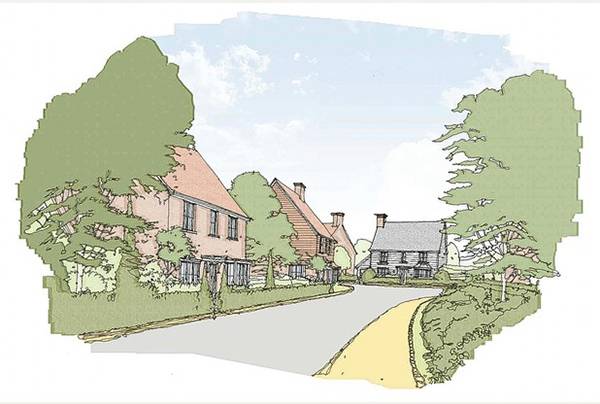The ‘tragic’ decision to approve a controversial housing development has sparked fears 12,000 more homes will be built in the borough than previously planned.
Last week a government planning inspector allowed an appeal over the development of 62 houses on a greenfield site on Highgate Hill, Hawkhurst, although he admitted it ‘would cause significant harm’ to the area.
The appeal, which was heard last month, was launched by Countryside Properties in November 2014 after Tunbridge Wells Borough Council rejected its initial application, following fierce opposition from Hawkhurst Parish Council.
Chairman Peter Dartnell told the Times: “Hawkhurst has been dealt a severe blow.
“It’s distressing, considering the amount of effort we put into opposing these proposals and putting alternatives forward.
“We feel we had very good grounds to have it refused. It’s unjustified. We can’t believe there aren’t other sites.
“The inspector is obviously under pressure to meet housing numbers in the southeast.
“I see this as a test case and others will come forward thinking they can build on greenfield land anywhere. It’s tragic.”
During the six weeks following the ruling, a High Court challenge can be mounted, but Mr Dartnell says that would be expensive and discussions are needed before any steps are taken.
Part of any challenge could be the dismissal of a similar appeal 18 months ago. A development of 120 homes at Fowlers Park, Hawkhurst, was rejected largely because it conflicted with policy seeking to protect the character of localities and Areas of Outstanding Natural Beauty.
The inspector in the Highgate Hill case allowed the appeal while stating the proposals are ‘contrary to the objectives of’ these policies.
In justifying the decision, he labelled TWBC’s target of 300 new homes per year, between 2006 and 2026, as ‘out of date’, saying a recent council assessment suggested 648 will be needed per year until 2033.
Borough councillor Linda Hall said: “He admits on one hand the AONB is important and needs protecting, but on the other gives the game away.
“It’s government pressure for new houses and he has to give way to that.”
“When Greg Clark was developing the National Planning Policy Framework, a number of us were nervous and asked him about constraints.
“He made it very clear that if you have constraints, like green belt, AONB or flood plains, you cannot build there – the constraints will protect you.
“We had even removed Highgate Hill from our core strategy, so the inspector has overruled the council, not just planning policy.
“The reason he gave is that we haven’t met our five-year housing supply. But we have, going by the 6,000 new homes agreed in our local plan.
And Cllr Hall fears there could be worse news to come, with a planning inspector due to review TWBC’s core strategy this winter.
She said: “Some people are worried he’ll tell us we need to triple that number. That would be the straw that broke the camel’s back.”
From Greg Clark’s speech to the House of Commons introducing the National Planning Policy Framework
“One of the three fundamental objectives of the NPPF is to put unprecedented power in the hands of communities to shape the places in which they live.”
“Too much development in recent years has been mediocre, insensitive and has detracted from the character of the areas in which we live and work.”
“Too many of our habitats have been degraded and nature driven out.”
“The planning system takes on the challenge of enshrining the local plan – produced by local people – as the keystone of the planning system.”
“Relevant policies – such as those protecting green belt, Sites of Special Scientific Interest, national parks and other areas – cannot be overridden by the presumption in favour of sustainable development.”
This week Greg Clark declined to comment on the latest developments.








